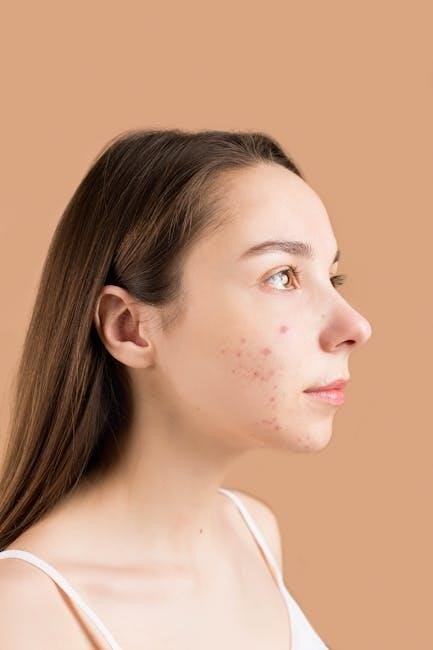Puberty is a natural process where boys develop into young men, experiencing physical and emotional changes․ It’s an exciting journey marked by growth, hormonal shifts, and self-discovery․
What is Puberty and Why is it Important?
Puberty is a biological process marking the transition from childhood to adulthood, during which boys develop sexually and reach reproductive maturity․ It involves physical changes, such as growth spurts and hormonal shifts, and emotional adjustments․ Puberty is crucial as it prepares the body for adulthood, enabling functions like sperm production and fertility․ Understanding puberty helps boys navigate its challenges, fostering emotional resilience and self-awareness․ It’s a cornerstone of development, shaping identity and future health․ Recognizing its significance ensures boys can embrace this transformative phase with confidence and clarity․

Physical Changes During Puberty
During puberty, boys experience significant physical transformations, including rapid growth spurts, muscle development, and changes in body shape․ These changes prepare the body for adulthood․
Testicular and Scrotal Growth
The first visible sign of puberty in boys is often the enlargement of the testicles and scrotum․ The testicles grow in size and the scrotal skin thins and reddens․ This change is triggered by hormonal shifts, particularly testosterone․ As puberty progresses, the testicles continue to develop, enabling sperm production․ The scrotum may darken in color and become more textured․ These changes are essential for reproductive maturity and occur gradually over several years․ It’s normal for boys to notice these developments and feel a sense of curiosity or adjustment as their bodies mature․
Penis Enlargement
During puberty, the penis begins to grow longer and wider, a process driven by increasing levels of testosterone․ This change typically starts around ages 11 to 13․ The enlargement occurs gradually, with the penis reaching its adult size by the late teenage years․ Some boys may notice that their penis grows more in length, while others may experience more widening․ It’s important to remember that every boy’s growth pattern is unique, and there’s a wide range of normal sizes and development timelines․ This natural process is a key part of maturing into a young man․
Height and Body Shape Changes
During puberty, boys experience a rapid growth spurt, with height increasing significantly, often peaking around 13 to 14 years old․ This growth surge, triggered by hormones, can make limbs feel out of proportion temporarily․ Boys may feel clumsier as arms, legs, and feet grow faster than the rest of the body․ Over time, the body aligns, leading to broader shoulders and a more muscular build․ This transformation reshapes the body, creating a taller, stronger, and more defined male physique, marking the transition from childhood to a more adult-like appearance․
Facial and Body Hair Development
Facial and body hair growth begins subtly during puberty, typically starting with light, fine hair on the face, underarms, and around the genitals․ Over time, this hair becomes thicker, darker, and more noticeable․ Boys may first notice hair appearing on the upper lip, chin, and cheeks, which eventually fills in to form a more defined beard․ Body hair also spreads to areas like the chest, back, and legs․ This gradual process signifies the transition to manhood and is driven by hormonal changes, particularly testosterone․ It’s a natural and essential part of maturation, helping boys feel more confident and grown-up․
Voice Changes
Voice changes are a key part of puberty for boys․ As the larynx (voice box) grows and vocal cords thicken, the voice gradually deepens․ This process is driven by rising testosterone levels․ Early on, the voice may “crack” or fluctuate unpredictably, which is normal․ Over time, the voice stabilizes into a deeper, more adult tone․ This change can take several years to complete and varies among individuals․ It’s a visible sign of maturation, though it can be awkward during the transition․ Patience is important as the body adjusts to these hormonal shifts, ultimately resulting in a confident, deeper voice․
Hormonal Changes
During puberty, hormones like testosterone surge, triggering growth and development․ These changes are regulated by the brain, driving physical and sexual maturation in boys․
Role of Testosterone
Testosterone is a key hormone during puberty, driving the development of male characteristics․ It stimulates muscle growth, bone density, and the maturation of reproductive organs․ Increased testosterone levels also lead to the growth of facial and body hair, deepening of the voice, and the onset of sperm production․ This hormone plays a central role in transforming a boy’s body into that of a young man, influencing both physical changes and emotional development․
Sperm Production and Fertility
During puberty, boys begin producing sperm, marking the start of fertility․ This process starts when the testicles mature and release testosterone, enabling sperm development․ Sperm production is a natural part of puberty, typically beginning around ages 11 to 13․ This milestone signals the ability to father a child, highlighting the importance of understanding fertility and responsibility․ As boys mature, they should be aware of these changes and their implications, fostering a healthy understanding of their reproductive health and the significance of sperm production in their development․

Emotional and Social Changes
Puberty brings emotional ups and downs, mood swings, and a growing need for independence․ Boys often experience self-consciousness and seek to establish their identity and social standing․
Mood Swings and Emotional Fluctuations
During puberty, boys often experience sudden mood changes due to hormonal surges․ One moment they may feel happy, and the next, they might feel irritable or overwhelmed․ These fluctuations can be confusing and challenging for both the young person and their family․ It’s important to remember that these emotional shifts are a normal part of development․ Open communication and patience help boys navigate these changes, teaching them how to manage their emotions healthily․ Understanding and support from loved ones play a crucial role in helping them cope with these feelings․
Self-Esteem and Body Image
During puberty, boys often face challenges with self-esteem and body image; Rapid physical changes can make them feel self-conscious, especially if they compare themselves to others․ Societal expectations and media portrayals of the “ideal” male body can add pressure․ It’s important for boys to understand that everyone develops at their own pace and that no one looks the same․ Encouraging a positive body image and fostering self-confidence helps them navigate this sensitive time․ Reminding them of their strengths and individuality can counteract feelings of insecurity, promoting a healthier mindset during these transformative years․
Understanding Wet Dreams and Nocturnal Emissions
During puberty, boys may experience wet dreams, or nocturnal emissions, which are involuntary ejaculations during sleep․ These are caused by hormonal changes and sexual maturation․ Wet dreams are a normal part of development and occur as the body begins producing sperm․ They are not related to sexual dreams or desires but are a natural process․ It’s important to reassure boys that this is a normal sign of growing up and not something to be embarrassed about․ Open conversations with parents or trusted adults can help boys understand and manage these changes confidently․
Hygiene and Self-Care
During puberty, proper hygiene is crucial․ Shower daily, use deodorant to manage body odor, and wash clothes regularly․ Keep skin clean to prevent acne and maintain confidence․
Managing Body Odor and Sweating
As hormone levels rise during puberty, boys often experience increased sweating and body odor․ To stay fresh, shower daily with antibacterial soap and wear clean clothes․ Using a deodorant or antiperspirant can help control sweat and odor․ Wearing breathable fabrics like cotton can also reduce moisture buildup․ If body odor persists, consider using an antiperspirant with higher protection or consulting a healthcare provider for additional advice․ Good hygiene practices will help maintain confidence and comfort during this transition․
Acne and Skin Care
Acne is common during puberty due to hormonal changes and increased oil production․ To manage it, wash your face twice daily with a gentle cleanser and use non-comedogenic products․ Avoid touching your face and remove makeup properly․ If acne persists, consult a dermatologist for treatments like benzoyl peroxide or retinoids․ Regular skin care helps reduce breakouts and prevent scarring․
Pubic Hair Maintenance
During puberty, pubic hair grows thicker and darker․ To maintain hygiene, keep the area clean by washing regularly with mild soap․ Some choose to trim or shave, but this is optional․ If shaving, use a clean razor and shaving cream to avoid irritation․ Trimming helps prevent ingrown hairs and keeps the area tidy․ Always dry thoroughly after bathing to prevent fungal infections․ Pubic hair maintenance is personal, so choose what makes you comfortable and confident while maintaining good hygiene practices․

The Tanner Stages of Puberty
The Tanner Stages outline five phases of physical development during puberty, tracking growth in height, genitals, and pubic hair, helping to understand the progression of maturation․
Understanding the Five Stages of Development
The Tanner Stages divide puberty into five distinct phases, tracking physical growth and sexual maturation․ Stage 1 is pre-puberty, with no significant changes․ Stage 2 marks the beginning of testicular enlargement and light pubic hair․ In Stage 3, the penis grows, and pubic hair becomes darker and thicker․ Stage 4 brings significant penis enlargement, facial hair, and voice deepening․ Finally, Stage 5 represents full maturity, with adult-sized genitals and complete body hair development․ These stages provide a clear framework for understanding the gradual progression of puberty in boys․

Emotional Well-Being
Puberty brings emotional challenges, including self-consciousness and mood swings․ Open communication and support help boys navigate these changes, fostering confidence and emotional resilience during this transition․
Support Systems for Boys Going Through Puberty
Having a strong support system is crucial for boys navigating puberty․ Parents, caregivers, and healthcare providers play key roles in offering guidance and reassurance․ Open conversations about physical and emotional changes help reduce embarrassment and build trust․ Encouraging boys to ask questions fosters a sense of security․ Peer support from friends or support groups can also provide relief and shared understanding․ Additionally, educational resources, such as books or online guides, can empower boys with knowledge about their development․ A supportive environment helps them cope with challenges and thrive during this transformative phase․
Addressing Embarrassment and Social Pressures
Embarrassment and social pressures are common during puberty, as boys navigate rapid changes and comparisons with peers․ Open conversations with trusted adults or friends can help reduce feelings of self-consciousness․ Reminding boys that everyone experiences these changes at their own pace fosters confidence․ Encouraging self-acceptance and emphasizing that it’s okay to ask questions can ease societal pressures․ Building resilience through positive reinforcement helps boys handle teasing or comparisons․ Creating a supportive environment where they feel understood is key to overcoming embarrassment and thriving socially during this transition․
